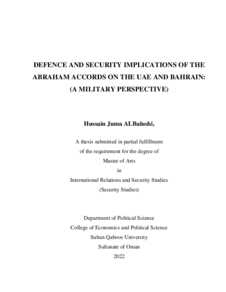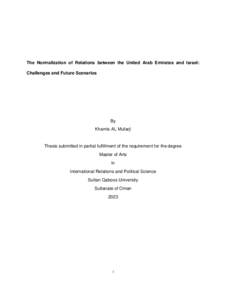Document
Defence and security implications of the Abraham accords on the UAE and Bahrain : a military perspective.
Other titles
التداعيات الدفاعية والأمنية لاتفاقات إبراهيم على الإمارات والبحرين : من منظور عسكري
Publisher
Sultan Qaboos University.
Gregorian
2022
Language
English
Subject
English abstract
Over the past century, attempts to normalise relations with Israel have been strongly resisted
throughout the Arab and Islamic world if there is not a lasting solution to the Palestinian-Israeli
conflict. Israel has long been regarded as a major threat to the security of Arab countries, as well as
the security of the region in general. Egypt became the first Arab country to normalise official
relations with Israel by signing a peace agreement in 1979. In 1993 and 1994, respectively, the
Palestine Liberation Organization (LPO) and Jordan normalised their relations with Israel.
Although some Arab countries maintained secret relations with Israel in the past, the Arab position
regarding normalisation of relations with Israel has not changed. The situation has changed
considerably in recent years, and the process of normalisation has been gaining traction in a variety
of fields and becoming more public. Thus, this led to normalisation of relations between two Gulf
states, the UAE and Bahrain, with Israel by the end of 2020. It was followed by two more Arab
countries, Sudan and Morocco, which opened a new chapter in the history of Israel-Arab relations.
This thesis provides a comprehensive analysis of the security and military implications of the
Abraham Accords in the Gulf States, particularly the United Arab Emirates (UAE) and the
Kingdom of Bahrain. It argues that there has been a trend in recent literature toward suggesting
that the Abraham Accords will make the Middle East more peaceful and translate into more
accommodationist foreign policies in some Gulf states. However, the author suggests that such
analyses of the current political situation in the Middle East are over optimistic and cast a cloud
over the future of political conflict in the region. To understand these changes, this thesis stresses
the role of the Abraham Accords in changing the regional and political scene and explores how the
self-interest' approach (a state's national interests) of some countries in the region has prevailed
over attempts to end violent conflict. This research found that the region's countries' current
political climate and security concerns are likely to lead to a change in their external political
behaviour with each other, particularly in the Gulf states. As political experts and scholars
generally believe, external threats drive the formation of military alliances to deter these threats
and maintain a balance of power. However, existing studies of military alliance formation have
indicated that in some cases, such alliances may lead to increased violence and conflicts between
states. The author argue that the formation of an alliance between Israel, the United Arab Emirates
and Bahrain to counter Iran is likely to cause Iran to feel threatened and adopt anti-Gulf policies.
As such, it is likely to increase rather than resolve the underlying danger of violent conflict for
which the alliance was formed. Due to Israel's presence in the Gulf near the Iranian border and the
military support Bahrain and the UAE may receive from the US and Israel, Iran is likely to adopt
an anti-Gulf policy, potentially posing threats to those countries' internal and external security.
Member of
Resource URL
Arabic abstract
تبنت الدول العربية والإسلامية، ولعقود عديدة، موقف مناهض ألي شكل من أشكال تطبيع العلاقات مع إسرائيل إن لم يكن هناك حل دائم للصراع الفلسطيني الإسرائيلي. فهذه الدول كانت تعُدُّ إسرائيل على أنها الخطر الرئيسي لأمنها القومي، وكذلك أمن المنطقة ككل. وبتوقيع مصر على اتفاقية السلام مع إسرائيل في عام 1979م، أصبحت بذلك أول دولة عربية تطبع العلاقات معها رسميًا؛ األمر الذي أدى فيما بعد إلى قيام منظمة التحرير الفلسطينية بتطبيع العلاقات مع إسرائيل كذلك في عام 1993م، وتبعتها بعد ذلك األردن في عام 1994م. وبالرغم من إقامة بعض الدول العربية عالقات سرية مع إسرائيل في الماضي، إلا أن موقفها تجاه تطبيع العلاقات معها ظل ثابتًا. ولم يدم موقفها هذا طويلا؛ فقد تغير بشكل ملحوظ في الآونة الأخيرة، واكتسبت عملية التطبيع اهتماما وتعاونًا في مجاالت شتى، بل وأنها أصبحت علنية وفي تزايد. الأمر الذي أدى إلى قيام دولتين خليجيتين وهما الإمارات والبحرين بتطبيع علاقات رسمية مع إسرائيل بنهاية عام 2020م، ومن ثم تلتهما دولتان عربيتان وهما السودان والمغرب، وفُتحت يقدم هذا البحث تحلي لتأثيرات الأمنية والعسكرية المتعلقة ًال شامًال بذلك صفحة جديدة في تاريخ العلاقات اإلسرائيلية العربية. ل باالتفاقيات اإلبراهيمية على دول الخليج العربي، وباألخص دولة اإلمارات العربية المتحدة ومملكة البحرين. حيث تناقش هذه الورقة البحثية أن هناك اتجاها في المنشورات الحديثة تشرح ماهية هذه الاتفاقية، ولما لها من دور في جعل منطقة الشرق الأوسط وسلاما، وهذا سوف يترجم إلى سياسات إقليمية أكثر تقبًلا أكثر أمنًا واستيعابًا للغير. ومع ذلك، فإن مثل هذه التحليلات المفرطة في التفاؤل لللأحداث السياسية الجارية في الشرق الأوسط تميل إلى التعتيم على مستقبل الصراع السياسي في المنطقة. ومن أجل فهم هذه التغيرات تستعرض هذه الورقة الدور الذي تقوم به هذه الاتفاقية في تغيير المشهد السياسي واإلقليمي، وكيف أن نهج "مصالح الدولة الواحدة" لبعض الدول في المنطقة ساد على الهدف الأساسي والمتمثل في المقام الأول والأخير في محاولة إنهاء العنف والصراع في المنطقة. لذلك يرى الباحث أن المناخ السياسي الحالي، والمخاوف الأمنية لدول المنطقة من المرجح أن تؤدي إلى تغيير هذه الدول في سلوكها السياسي الخارجي تجاه بعضها البعض، وباألخص دول الخليج العربي. وك ما يعتقد الخبراء السياسيون عموما، فالتهديدات الخارجية عادة ما تدفع إلى تشكيل تحالفات عسكرية لردع مثل هذه التهديدات، ومن أجل الحفاظ على موازيين القوى. وبالرغم من ذلك، تشير الدراسات الحالية للتحالفات العسكرية المشكلة إلى أن هذه التحالفات - في بعض الحالات - قد تؤدي إلى زيادة العنف والصراعات بين الدول على عكس الهدف الذي أنشئت من أجله. ويناقش الباحث أن التحالف اإلسرائيلي واإلماراتي والبحريني في مواجهة إيران، من المحتمل أن يؤدي إلى شعور إيران بالتهديد، الأمر الذي يدفعها إلى تبني سياسات مناهضة لدول الخليج. عليه، فإن هذا التحالف على الأغلب سيزيد من نسبة التهديد بدلا من تجنب الخطر الكامن وراء الصراع والذي أنشأ التحالف من أجله. ونظرا للوجود الإسرائيلي في الخليج بالقرب من الحدود الإيرانية، والدعم العسكري الذي قد تتلقاه البحرين والإمارات من أمريكا وإسرائيل، فمن المرجح أن تتبنى إيران سياسة مناهضة للخليج، مما قد يشكل تهديدات محتملة لأمنها الداخلي والخارجي.
Category
Theses and Dissertations


